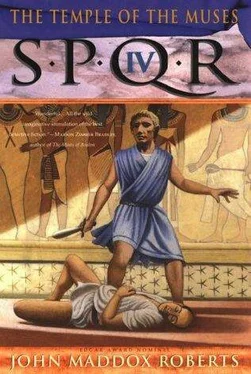John Roberts - Temple Of Muses
Здесь есть возможность читать онлайн «John Roberts - Temple Of Muses» весь текст электронной книги совершенно бесплатно (целиком полную версию без сокращений). В некоторых случаях можно слушать аудио, скачать через торрент в формате fb2 и присутствует краткое содержание. Жанр: Исторический детектив, на английском языке. Описание произведения, (предисловие) а так же отзывы посетителей доступны на портале библиотеки ЛибКат.
- Название:Temple Of Muses
- Автор:
- Жанр:
- Год:неизвестен
- ISBN:нет данных
- Рейтинг книги:5 / 5. Голосов: 1
-
Избранное:Добавить в избранное
- Отзывы:
-
Ваша оценка:
- 100
- 1
- 2
- 3
- 4
- 5
Temple Of Muses: краткое содержание, описание и аннотация
Предлагаем к чтению аннотацию, описание, краткое содержание или предисловие (зависит от того, что написал сам автор книги «Temple Of Muses»). Если вы не нашли необходимую информацию о книге — напишите в комментариях, мы постараемся отыскать её.
Temple Of Muses — читать онлайн бесплатно полную книгу (весь текст) целиком
Ниже представлен текст книги, разбитый по страницам. Система сохранения места последней прочитанной страницы, позволяет с удобством читать онлайн бесплатно книгу «Temple Of Muses», без необходимости каждый раз заново искать на чём Вы остановились. Поставьте закладку, и сможете в любой момент перейти на страницу, на которой закончили чтение.
Интервал:
Закладка:
"Come on, let's find a table," Hypatia urged. We wandered into the maze, taking so many turns that I despaired of ever finding a way out again. It is the virtue of such a place that you don't really care if you ever get out. Eventually we found a table with a top no larger than the thumping tambours of the musicians. A bright-eyed girl placed cups on our table and filled them. As she bent over, her breasts nearly fell out of her brief tunic. Hypatia eyed her as she danced away.
"A pity it's so cool," she said. "Most of the year they wear less."
We raised our cups and saluted each other. The cups were of finely polished olive wood, in keeping with the air of poetic rusticity. The wine was Greek, sharply resinous. A boy dressed as a faun brought a platter of fruits and cheeses. After the fanciful fare of the Palace, which was a delight to the eye and palate and a disaster to the digestion, this simple food was a distinct relief.
A troupe of Argive youths and maidens came through, performing the very ancient crane dance. Then came a huge, brawny man dressed as Hercules with a lion skin, who entertained the crowd with feats of strength. Then came singers who sang erotic verse or praises of the nature gods. There was no epic verse or songs of the deeds of warriors. It was as if all such unpleasantness had been banished for the night.
I found that one becomes a different person when wearing a mask. One is no longer constrained by the rigid views of one's upbringing and may instead adopt the persona of the mask, or else dispense with all such coercion and see the world as a god looking down from a passing cloud. Just so a gladiator, in donning the anonymity of the helmet, ceases to be the condemned criminal or the ruined wretch who sold himself to the ludus, and becomes instead the splendid and fearless warrior he must be out on the sand. Without my accustomed cosmopolitan, not to say cynical, poses, I could see these revelers and these performers as the very characters from pastoral poetry they pretended to be.
Hypatia, the hard-mouthed professional woman, became an exotic, flower-haired creature, her hands on the olive-wood cup like lilies made animate. I had always thought pastoral verse one of the silliest forms, but I was beginning to understand its attractions.
And I? I was growing rapidly drunk. The setting and the company provided an unwonted abandon, one to which I was not accustomed. At home, I always had to consider the possible political consequences of even my most private indiscretions. In a place like the Palace, I had to be ever mindful of who was behind me, as a matter of self-preservation. But here there was no one behind me. And, in any case, I was no longer Decius Caecilius Metellus the Younger, slightly disreputable scion of a prominent Roman family. I was a character in one of those poems where all the women are named Phyllis and Phoebe and the men are not men but "swains" and they're all named Daphnis or something of the sort.
In short, I let my guard down completely. I realize this sounds like the utmost folly, but a life lived cautiously is a dull one. All the really careful and cautious men I ever knew were drab wretches, while those who eschewed caution had interesting if brief lives.
Before long, I had our serving-girl, or one just like her, seated in my lap, while a faun-boy occupied the same place on Hypatia. They sang and popped grapes into our mouths as general liberties were taken by all. I learned more ways to drink someone's health in Greek than I ever dreamed could exist. Versatile language, Greek.
At some point during the night I found myself standing behind Hypatia, my hands on her lissome hips, and someone else's on mine. This might have been alarming, but it turned out that we were all doing the crane dance under the tutelage of the Argive youths and maidens. Like the bird for which it is named, the crane dance is a blend of grace and awkwardness. Hypatia supplied one and I the other. I had never danced before. Roman men never dance unless they belong to one of the dancing priesthoods. It seemed to me that these Greeks had happened upon a good thing.
The moon was very low when the whole reveling crowd poured out of the Daphne and wound its way up the spiral path of the Paneum. Live creatures mixed with the bronze ones along the path, cavorting and disporting themselves in the time-honored fashion of rural worshippers. In the heat of their exertions, many had divested themselves of clothing along with their inhibitions and sense of decorum.
In the sanctuary we all sang traditional hymns to Pan in the Arcadian dialect. The flickering light of the torches played over the bronze god and I thought I saw him smile, a real smile, not the fraudulent grimacing of Baal-Ahriman. The women draped their garlands around his neck and over his outsized phallus, and a few of the masked ladies begged him to help them conceive. If the fervor of the worship were of any help, they would all surely bear twins.
It was an easy walk from the Paneum to the Palace, but I was sorry to see the place again. I was weary of its plots and intrigues, and for all its luxuries it seemed a grim place after a magical night spent in the Daphne.
"I must leave you here," Hypatia said as we approached the gate nearest the Roman embassy. "My protector keeps me in a house close by. It is forbidden for women to be housed in the Parthian embassy."
"How will you come to me tomorrow?" I asked, reluctant to see her go despite my better instincts.
She pushed back her mask, came into my arms and kissed me. She was like a sack of wriggling eels, and I was ready to carry her into a doorway and make good on the offer I had turned down in the Necropolis. But she pulled away and placed her fingers across my lips.
"It is too late now, the time is past. But look for me to come tomorrow evening. One with the right friends can go about freely within the Palace, and I have more friends than most. I will bring the book, and you will help me to establish myself in Rome."
"I have given my word," I said.
"Good night, then. Until tomorrow." She turned and was gone.
With a sigh I staggered toward the gate. I remembered to take off my mask and stuck it inside my tunic. The guard at the gate sleepily returned my equally sleepy salute. The Palace was as lifeless as the Necropolis as I made my way across its elaborate pavements.
The embassy was, if anything, even more devoid of life, not even a slave stirring. That suited me perfectly. I was sure that, by this time, my appearance must confirm Creticus's worst fears about me. I made my way to my quarters undetected and dropped my cloak to the floor, let my weapons clank onto a table, then thought better of that and locked them away in my chest. The mask I hung on the wall.
I left my tunic where it fell and brushed the vine leaves from my hair before collapsing into my bed. It had been one of the most eventful days of my life. Had it really started out with my visit to Baal-Ahriman? It seemed more like weeks ago. First the fine intellectual exercise of deciphering the trickery of Ataxas, then my flight through the Rakhotis, culminating in the Salt Market riot.
Then the night, which had begun in a city of the dead and ended in a veritable Arcadian fertility rite. Even at my most adventurous, I was unaccustomed to so many changes of venue and circumstance. In this place death lurked in many places and took many guises, but I would never die of boredom.
The memory of Hypatia writhing against me was unsettling, but I knew that I would see her again the next night. Perhaps there was some other site of exotic debauchery we could try. And perhaps what she was to bring me would solve the mysteries surrounding the death of Iphicrates.
I was well pleased with the events of the day and the prospects for the morrow. It was just as well that I could go to sleep in such a state of complacency, because when I woke up, there was a dead woman in bed with me.
Читать дальшеИнтервал:
Закладка:
Похожие книги на «Temple Of Muses»
Представляем Вашему вниманию похожие книги на «Temple Of Muses» списком для выбора. Мы отобрали схожую по названию и смыслу литературу в надежде предоставить читателям больше вариантов отыскать новые, интересные, ещё непрочитанные произведения.
Обсуждение, отзывы о книге «Temple Of Muses» и просто собственные мнения читателей. Оставьте ваши комментарии, напишите, что Вы думаете о произведении, его смысле или главных героях. Укажите что конкретно понравилось, а что нет, и почему Вы так считаете.









